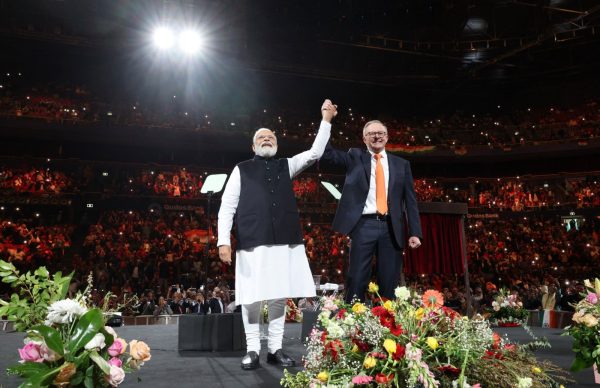
China and India might be seen as each other’s geopolitical opponents, but last month, they were both at the receiving end of similar exposés in the great global espionage game.
In Britain and Germany, six individuals were arrested on charges of spying for Beijing. Among those arrested were a young aide to a prominent member of the British Parliament, and a German citizen of Chinese descent who worked for a far-right German member of the European Parliament. The accusations, authorities said, involved infiltrating the political establishment and attempting to influence the democratic process.
Meanwhile, in Australia, reports said that a few Indian spies had been removed from the country a few years ago after they were caught trying to steal sensitive defense secrets, obtain classified information on trade, and monitor the Indian diaspora.
Espionage is standard fare for almost all global powers, but China and India stand out for their specific interest in their country’s mammoth diaspora.
For years, China has spied on its own diaspora through various means. In the initial years, these efforts were largely driven by paranoia following the flight of dissidents as far back as after the Tiananmen Square protests. But in more recent years, Beijing has also cultivated neo-nationalist diaspora elements to do much more than merely spy on Chinese dissidents; members of the Chinese diaspora have been caught trying to infiltrate Western institutions and pilfer trade secrets, influence political decision-making, and obtain sensitive defense technology.
New Delhi is increasingly watching and learning.
India has long been dismayed that in the great power game, its economic influence is sorely lacking. In the last four decades, China has built an extraordinary trade footprint covering much of the world. In 2001, when China first acceded to the World Trade Organization, over 80 percent of countries for whom data was available counted the U.S. as a larger trade partner than China. By 2018, the tables had flipped: two-thirds of the world was trading more with China than with the U.S. that year, according to Australia’s Lowy Institute.
In 2022, China accounted for over 14 percent of the world’s total export in goods. India’s share was less than 2 percent.
Under Prime Minister Narendra Modi, India has made a strong rhetorical push to correct this disparity. But India’s weak integration in terms of trade and investment agreements, its relatively poor labor productivity, and continued infrastructure problems have kept that gulf wide. Instead, Modi made an intelligent calculation early on that India had to rely on a different, more potent asset to grow its global influence: its vast, highly-skilled, and politically influential diaspora.
Indians abroad make up the largest diaspora group in history: some 18 million people, according to the United Nations. Each year, they send back record sums of money in remittances — as much as $125 billion in 2023 alone. They are also among the highest income-earning groups across much of the West, and occupy positions of high power across politics, business and the arts.
Very early in his term, Modi attempted to connect with the diaspora in ways that none of his predecessors had done — holding massive rally-like events in New York, Sydney, and elsewhere. That was at the time a conscious foreign policy effort. In 2015, Ram Madhav, then the general secretary of Modi’s Bharatiya Janata Party (BJP), explained: “[The diaspora] can be India’s voice even while being loyal citizens in those countries. That is the long-term goal behind diaspora diplomacy. It is like the way the Jewish community looks out for Israel’s interests in the United States.”
Yet, as Hindu nationalism came to dominate the BJP’s politics at home, the diaspora abroad became increasingly fragmented and incoherent. A 2020 survey of Indian Americans by the Carnegie Endowment for International Peace found that as much as 69 percent of Hindus in the United States approve of Modi’s performance as prime minister. Yet, only 20 percent of Muslims and 34 percent of Christians did.
Democrats in the survey were also less likely to approve of Modi and the BJP than Republicans, and that has also borne out on Capitol Hill. When Modi visited Washington for a state visit last year, a handful of progressive Democrats publicly protested and vowed to boycott his speech. Another group of lawmakers — led by Indian American Representative Pramila Jayapal — signed a public letter, pushing President Joe Biden to raise human rights issues with Modi.
In more recent times, New Delhi has found itself at odds with Sikhs in the West. That fault line has resulted in accusations in Canada and the U.S. that agents of the Modi government were involved in plotting and executing the assassination of Sikh separatist leaders.
These tensions are unlikely to go away easily. Both China and India see their diaspora as an extension of their own national security. Scuffles with dissidents at home engender scuffles with dissidents in the West.
So far, the West’s response to India has been starkly different from its response to China, but it also faces a different challenge. For years, Europe and Australia continued to seek economic cooperation with China despite these tensions. But those ties have since come crashing down after Beijing sought to leverage its trade profile to coerce the European Union and Australia.
With India, the West has sought to strengthen security ties, in large part to cultivate an ally that can counterbalance China in the Indo-Pacific. Those ties have involved not only the transfer of advanced defense technology, but also intelligence-sharing, training, and joint operations.
But can such security cooperation run in tandem with New Delhi’s desire to expand its espionage operations in the West or monitor dissidents abroad? If the U.S. and its allies sense a risk that India may leverage its role in these information networks for purposes that aren’t mutually acceptable, it may jeopardize India’s security ties with the West.




















